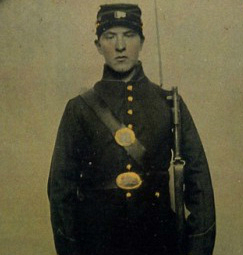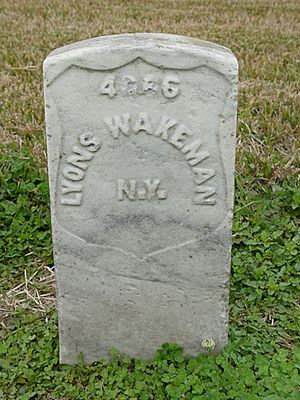Sarah Rosetta Wakeman facts for kids
Quick facts for kids
Sarah Rosetta Wakeman
|
|
|---|---|

January 16, 1843 – June 19, 1864
|
|
| Birth name | Sarah Rosetta Wakeman |
| Born | January 16, 1843 Chenango County, New York |
| Died | June 19, 1864 (aged 21) Marine USA General Hospital in New Orleans |
| Allegiance | United States |
| Service/ |
Union |
| Unit | 153rd New York Volunteer Infantry |
| Battles/wars | American Civil War |
Sarah Rosetta Wakeman (born January 16, 1843 – died June 19, 1864) was an American girl who joined the Union Army during the American Civil War. She pretended to be a man named Lyons Wakeman to serve. Sarah was part of Company H, 153rd New York Volunteer Infantry. Her letters, which tell her story, were hidden away for almost 100 years before anyone found them.
Contents
Why Did Sarah Join the Army?
Sarah Rosetta Wakeman was born on January 16, 1843, in Bainbridge, New York. She was the oldest of nine children in a farming family from Afton, New York. Her family faced money problems.
By age 17, Sarah had some schooling and worked as a house helper. To help her family and find better work, Sarah left home in 1862. She dressed as a man and got a job working on boats along the Chenango Canal.
While working, she met army recruiters. They offered a large payment of $152 to join the army. This was a huge amount of money, much more than she could earn as a woman. On August 30, 1862, Sarah joined the army. She used the name Lyons Wakeman and said she was 21 years old. She was actually only 17 or 18.
Her enlistment papers described her as five feet tall, with fair skin, brown hair, and blue eyes. She became a private in Company H of the 153rd New York State Volunteers.
Sarah's Time as a Soldier
Sarah's army group was first sent to guard duty in Alexandria, Virginia. Later, they moved to Washington, DC to protect the nation's food supplies. Even though army life could be boring and tough, Sarah wrote that she "liked to be a soldier very well."
She had a lot of free time, which she used to write many letters home. In her first letter, Sarah explained why she left home and what she was doing. She often sent money to her family, hoping to make things right with them. She signed her letters with her real name, Sarah Rosetta Wakeman. If anyone in the army had seen this, her secret could have been discovered.
Sarah often wrote about being able to earn her own money. This was something many women at that time wanted. She sent many letters to her family, telling them about her life as a soldier. Sarah was also religious, and her faith helped her during hard times. She was proud to be a "good soldier."
One interesting part of Sarah's service was when she guarded Carroll Prison in Washington. While there, she learned that one of the women held in the prison was arrested for doing the same thing Sarah was doing: pretending to be a man to fight for the Union.
First Battle Experience
In February 1864, Sarah's regiment was sent to an active battle area. Her unit took part in Major General Nathaniel P. Banks's Red River Campaign. The battle happened at Pleasant Hill, Louisiana. About 11,000 soldiers fought there.
Sarah survived her only known battle on April 9, 1864. After the battle, she sent her last letter home from Grand Ecore Landing on the Red River.
In this last letter, Sarah described her battle experience: "Our army moved up the river to Pleasant Hill, about 40 miles. There we had a fight. The first day of the fight our army was defeated, and we had to retreat back about 10 miles. The next day the fight started again around eight o'clock in the morning. There was heavy cannon fire all day and sharp infantry shooting. I was not in the first day's fight, but the next day I had to face the enemy's bullets with my regiment. I was under fire for about four hours and stayed on the battlefield all night. Three were wounded in my company, and one was killed. I am thankful to God that he saved my life, and I pray to him that he will lead me safely through the battlefield and that I may return home safely."
Sarah's Death and Her Story
Sarah wrote about the soldiers who died, saying they lay "sometimes in heaps and in rows… with twisted faces, among mangled and dead horses, trampled in mud." The Red River Campaign caused many deaths, including Sarah's.
She became sick with severe diarrhea and died on June 19, 1864. This happened at the Marine USA General Hospital in New Orleans. Many Union soldiers also died from drinking water that was not clean.
Sarah's true identity was not known when she was buried. Her headstone reads "Lyons Wakeman." She was buried with full military honors at Chalmette National Cemetery in New Orleans.
More than 100 years after her death, in 1976, her letters were found in a relative's attic. These letters told the story of her time as a soldier. In 1994, Sarah's letters were put into a book called An Uncommon Soldier: The Civil War Letters of Sarah Rosetta Wakeman, alias Pvt. Lyons Wakeman, 153rd Regiment, New York State Volunteers, 1862 - 1864. Sarah's relatives still have her letters, a photograph, and a ring that belonged to her.
See also
 In Spanish: Sarah Rosetta Wakeman para niños
In Spanish: Sarah Rosetta Wakeman para niños
 | Selma Burke |
 | Pauline Powell Burns |
 | Frederick J. Brown |
 | Robert Blackburn |


